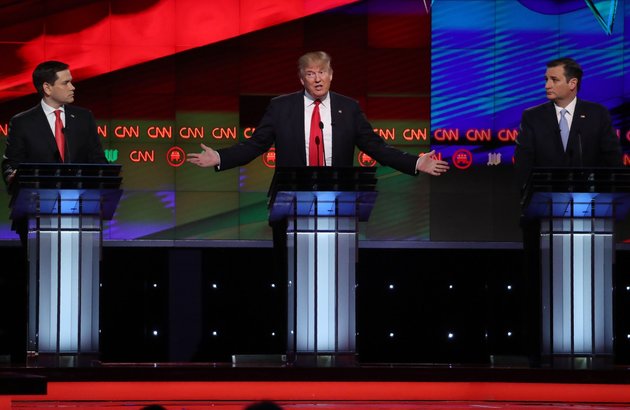WASHINGTON ― A month of scripting Donald Trump’s words and hiding him from all but the friendliest of interviews is about to pay off brilliantly Monday night at his first general election presidential debate.
Or it’s about to come crashing down around Republicans whose presidential nominee cannot possibly get through 90 uncoached minutes without reverting to his natural state.
“Give me steep odds,” joked one Republican National Committee member privately when asked if Trump could make it through the evening without saying something outlandish.
“Wasn’t it Pilate who said: ‘What is truth?’” joked another, when asked if Trump could check his propensity to toss out falsehoods.
Party leaders who started the primary season a year ago never imagining that the reality TV host could wind up as their nominee spent much of early August wondering whether a random name atop their ticket who said nothing at all could have been outperforming Trump. If only he would stick to attacking Democratic nominee Hillary Clinton and laying out basic Republican themes, rather than insulting a Mexican-American federal judge and the family of a Muslim American soldier killed in Iraq, he could have a decent shot at the White House.
Now, thanks to an intervention by the Trump family five weeks ago that brought in new campaign leadership, Republicans have accomplished exactly what they thought they could. Trump has turned an 8-point Clinton lead into a virtual tie in the latest national polls.
The plan itself was simple in concept. While original campaign manager Corey Lewandowski guided Trump to the Republican nomination with the strategy of “Let Trump be Trump,” his new handlers have insisted on the exact opposite.
Just a few months ago, a Trump campaign event meant a stream-of-consciousness discourse about his poll numbers, some insults about his opponents, a promise to build a wall along the southern border and to force Mexico to pay for it, the renegotiation of existing trade deals, and a promise to get tough somehow with Muslim immigration and the so-called Islamic State.
Starting a month ago, the teleprompters that he used to ridicule go with him everywhere. The rambling of his primary events has given way to prepared speeches containing mainly Republican boilerplates about lower taxes, fewer regulations, more school choice, more domestic energy production, more military spending ― with nods to trade, the border wall and terrorism.

Donald Trump got through the GOP primary debates by insulting his opponents on stage and ducking from policy discussions. It’s unclear whether a similar strategy would have good results against Democratic nominee Hillary Clinton in Monday night’s first general election debate.
An actual unscripted remark from Trump has become rarer ― an exception rather than the rule ― and has been mostly saved for evening rallies, when Trump appears to want to please his supporters with more off-teleprompter excursions. It was at a nighttime rally in Pensacola, Florida, earlier this month that Trump suggested that Iranian sailors who use gestures they shouldn’t be using toward U.S. Navy ships would be blown out of the water. It was at an evening Miami rally that Trump said Clinton should lose her Secret Service detail because of her support for stricter gun laws, and suggested that would result in violence against her.
Even more importantly, Trump has all but ended media interviews with organizations other than Fox News, and even those have favored morning show hosts and Trump supporter Sean Hannity. While Clinton, once derided by Republicans for not holding news conferences, has staged several brief ones with the reporters who travel with her, Trump has not had a news conference since July and has had only a single brief discussion with traveling reporters earlier this month.
That strategy has resulted in Monday night’s first debate looming as the first real trial by fire.
During the primary debates, Trump made his mark largely by promising to deport 11 million undocumented immigrants, insulting his rivals on stage and then retreating into the background when the discussion turned to policy.
It’s hard to imagine that technique working in a general election setting, where Trump has to win over not only the solid Republican base, but also groups he has struggled with, such as suburban, college-educated women. These key voters likely will not be impressed with “Crooked Hillary” insults, and almost certainly will expect a president to know basic facts about the United States and the world off the top of his head.
Neither self-discipline nor command of facts is a Trump characteristic, and 90 minutes of a one-on-one confrontation, with no prepared script and no coaching permitted, could test the limits of the campaign’s new model.
Trump has bragged about how he doesn’t study. Monday night could offer a glimpse into whether that strategy is a winning one for the nation’s highest office.


